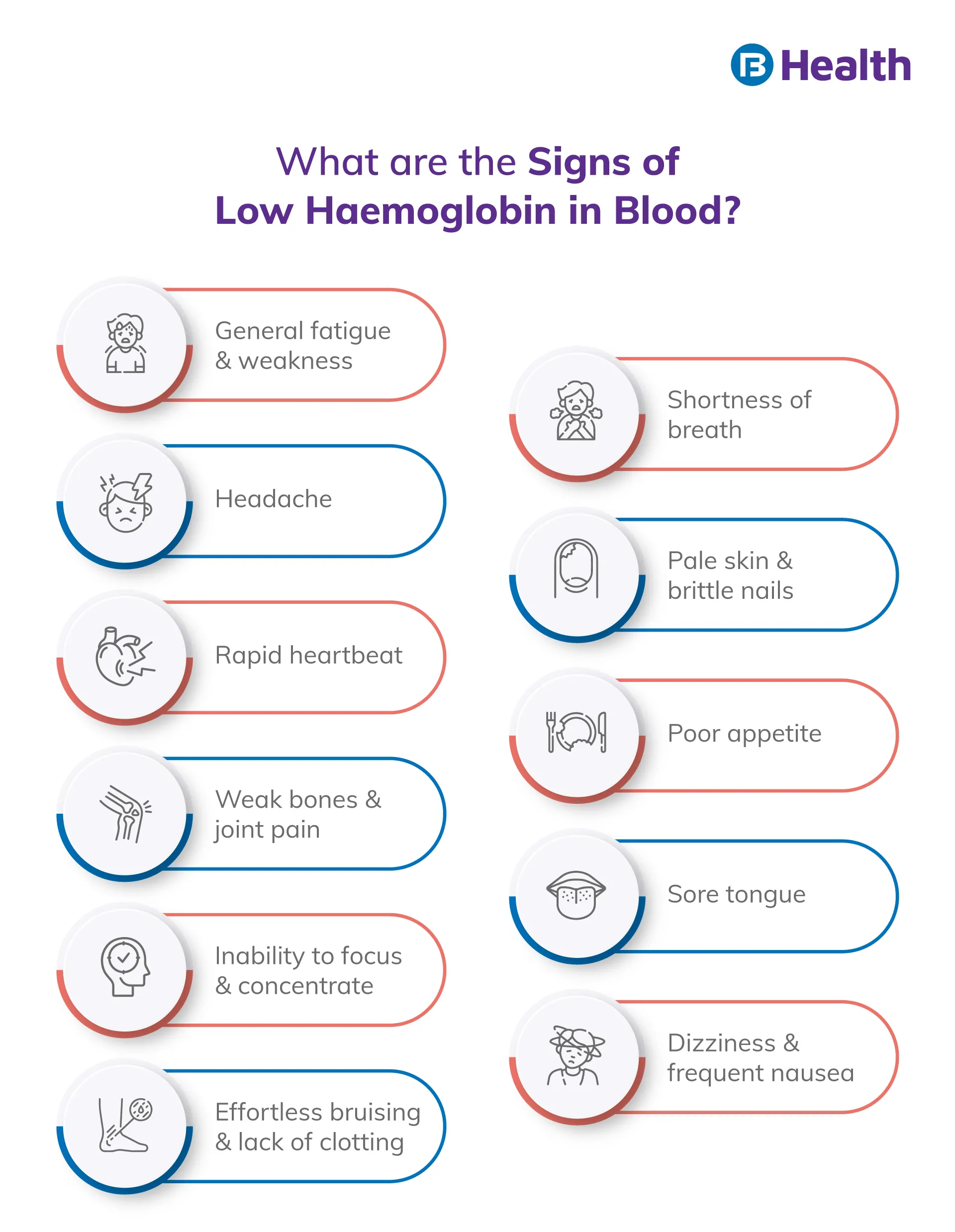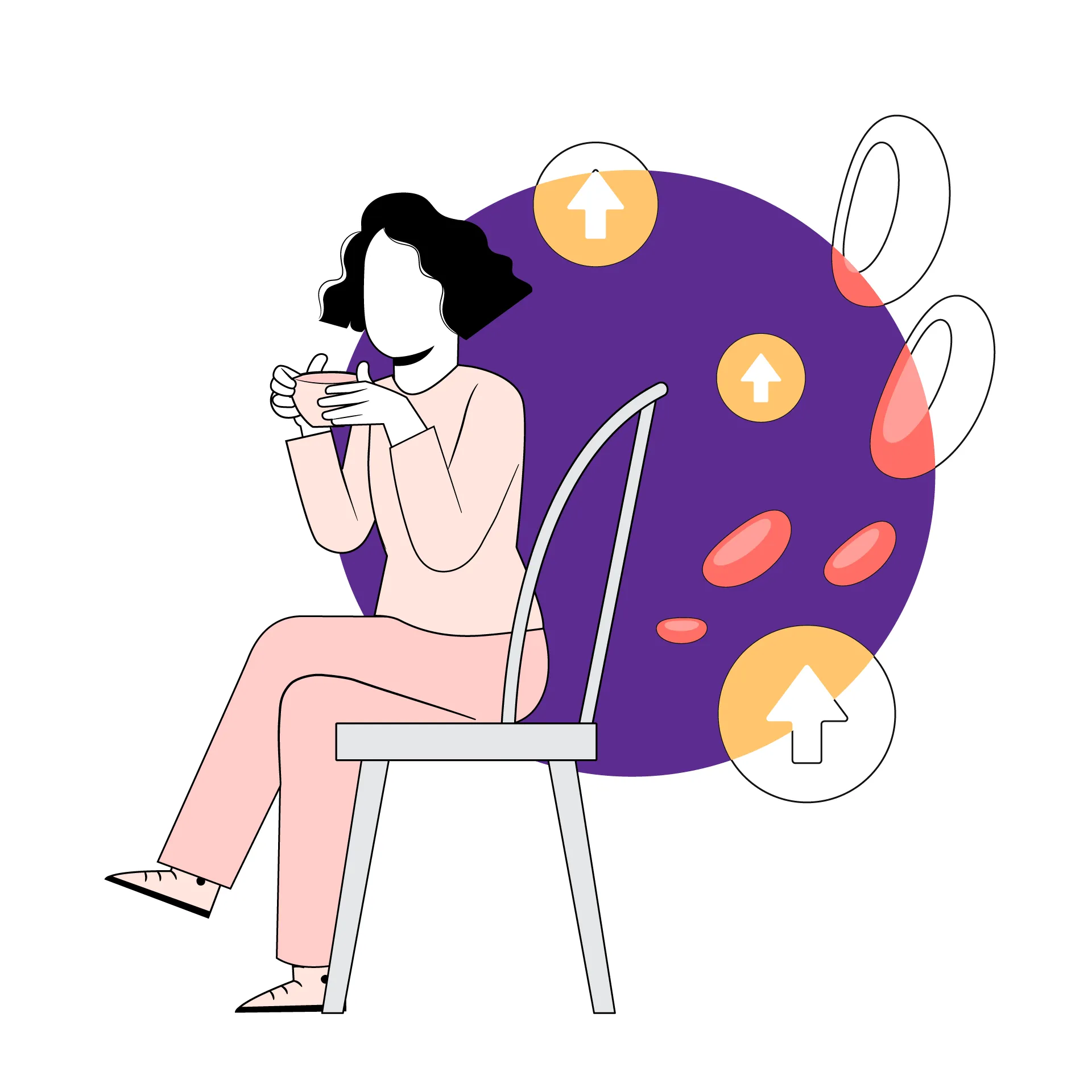General Health | 6 min read
10 Best Home Remedies for Increasing Haemoglobin Naturally
Medically reviewed by
Table of Content
Synopsis
Red blood cells contain a protein called haemoglobin, which is rich in iron and carries oxygen throughout the body. Normal haemoglobin levels in your blood are required for your body to properly function. If the haemoglobin level drops significantly, the condition is known as anaemia, and symptoms can become severe.
Key Takeaways
- Eating iron-rich vegetables like green peas, beans, and spinach can help produce haemoglobin
- Seafood and meat are a few foods high in iron which are also helpful in keeping haemoglobin levels high
- Folic acid is necessary for the production of iron which in turn is needed for making haemoglobin
What is Low Haemoglobin Count?
Before knowing how to increase hemoglobin, it is crucial that you know what the normal hemoglobin level is. Normal hemoglobin levels in your blood are required for your body to function properly. The normal range is 14 to 18 g/dl for men, 12 to 16 g/dl for women, and 11 to 16 g/dl for children. [1] When hemoglobin levels fall, it can result in weakness, headaches, fatigue, dizziness, shortness of breath, poor appetite, and rapid heartbeat.
If the haemoglobin level is lower than the normal haemoglobin range, the person is said to have low haemoglobin levels and should see a doctor.
A haemoglobin test can tell whether your haemoglobin levels are normal or not. Some symptoms can indicate a low haemoglobin count in the blood.
Additional Read: Types of Blood TestsSigns of Low Haemoglobin in Blood
Most people do not seek medical attention because a slight decrease in haemoglobin levels does not cause any symptoms. Low haemoglobin symptoms can help a practitioner identify the underlying cause. The following are some of the most common symptoms of low haemoglobin levels:
- General fatigue and weakness
- Shortness of breath
- Dizziness accompanied by frequent nausea
- Headache
- Pale skin and brittle nails
- Rapid heartbeat
- Poor appetite
- Effortless bruising and lack of clotting
- Weak bones and joint pain
- Sore tongue
- Inability to focus and concentrate
Patients with diabetes symptoms also need to be more careful, as it contributes to anaemia by reducing iron absorption.

How to Increase Hemoglobin
Most low haemoglobin count cases can get corrected with simple lifestyle changes such as eating a healthy and balanced diet and exercising regularly. Iron supplements and medication are advisable in some cases. Here are some easy tips and home remedies for how to increase haemoglobin levels in the blood.
1. Increase your intake of iron-rich foods
Spinach, chicken liver, asparagus, meat, broccoli, green peas, beans, fenugreek leaves, seafood, ground beef, cauliflower, and tomatoes are all high in iron. Eat iron-rich fruits like papaya, oranges, beetroot, pomegranate, banana, peaches, mulberries, apples, lychees, kiwi, guavas, apricots, watermelon, and strawberries to obtain iron naturally.
You can maintain the required haemoglobin level by including legumes (such as soy, red kidney beans, chickpeas, black beans, lentils, fava beans, and black-eyed peas), dates, almonds, wheat germ, sprouts, Indian gooseberry, herbs (such as nettle leaves, colocasia leaves), brown rice, whole grains, and sesame seeds in your diet.
2. Combine iron-rich foods with foods high in vitamin C
Despite eating an iron-rich diet, most people cannot maintain the required haemoglobin count. The body does not absorb iron from food, which is the cause. As a result, including Vitamin C is advised because it facilitates the body's absorption of iron. Citrus fruits (like Indian gooseberry, oranges, and lemons), strawberries, and dark leafy green vegetables are high in vitamin C.
3. Increase your folic acid intake
Folate, a B-complex vitamin, is essential for the production of red blood cells, and a lack of it not only lowers haemoglobin levels but also increases the risk of anaemia. Folic acid-rich foods are thus advisable for people with low haemoglobin levels. Green leafy vegetables, wheat germ, liver, fortified cereals, rice, peanuts, bananas, sprouts, broccoli, and dried beans are all high in folic acid. Although folic acid supplements are available over the counter, you should only take them after consulting with your medic.
4. Avoid foods that restrict iron absorption in the body
It is well-known that calcium is an iron blocker in the body. Calcium supplements should be consumed about an hour before or after iron consumption because they inhibit iron absorption in the body. Foods high in tannins, such as tea, coffee, wine, beer, cola, and aerated drinks, are also iron blockers.
5. Drink Nettle Tea
Nettle is a herb rich in vitamin B, iron, and vitamin C, and it can help you increase your haemoglobin levels. Add two teaspoons of dried nettle leaves to a cup of hot water for 10 minutes, then strain and drizzle with honey. You may consume it twice a day.
6. An Apple (or Pomegranate) a Day helps to keep the medic away
An apple a day can help maintain the required haemoglobin level because apples are high in iron and other health-promoting components needed for a healthy haemoglobin count. Even beetroot is a good source of iron. Pomegranates are also high in protein, fibre, calcium, iron, and calcium. Its nutritional value may help boost haemoglobin levels and encourage normal blood flow.
7. Choose intense workouts when you work out
There is no question about the importance of exercise in maintaining overall health. Exercise helps to improve blood circulation, which supports the production of haemoglobin and keeps you fit and healthy. Studies have shown that people with iron deficiency anaemia can improve haemoglobin levels by engaging in moderate- to high-intensity exercise. [2]
8. Take iron supplements only after consulting your general physician:
If the haemoglobin level is substantially lower, doctors may advise you for iron supplements. Men should take 8 mg daily of iron supplements, whereas women should take 18 mg daily. However, the dosage for expectant mothers is 27 mg per day. One should take no more than 29 mg of supplements daily out of caution, as doing so can cause unpleasant side effects like nausea, constipation, and vomiting. It may even result in liver cirrhosis in severe cases. On the other hand, this can help increase hemoglobin levels quickly.
9. Use brown rice
Brown rice is a superfood that can help prevent several diseases, including high cholesterol and stomach problems. It is also high in iron and can increase the haemoglobin count in the blood. Brown rice has 0.52 mg of iron per 100 grams.

10. Consume dark chocolate
Dark chocolate containing more than 80% cacao is a good source for a rise in haemoglobin levels in the blood. Dark chocolate contains nutrients, minerals, and antioxidants and is also high in iron, with one medium-sized bar containing up to 6.9% of the daily recommended iron intake.
Additional Read: Iron-Rich FoodWhen to See a Doctor?
Some cases of low haemoglobin cannot be corrected merely through diet and supplements. If you experience any of the following symptoms while attempting to raise your haemoglobin level, get a doctor consultation:
- Pale gums and skin
- Fatigue and muscle weakness
- A fast or irregular heartbeat
- Frequent headaches
- Unusual bruising
While incorporating iron-rich foods into your diet, bear the importance of a well-balanced diet, as excess iron intake can lead to health complications. To avoid iron deficiency, focus on developing healthy eating habits. However, consult your doctor if you notice symptoms of anaemia or any other health condition.
hrough Bajaj Finserv Health, you can choose packages that include various blood tests. You can alleviate your concerns and treat your symptoms from the comfort of your home by scheduling an in-clinic or online doctor consultation. You can also get some suitable tips on how to increase hemoglobin.
References
- https://www.ncbi.nlm.nih.gov/pmc/articles/PMC3685880/
- https://www.ncbi.nlm.nih.gov/books/NBK259/
Disclaimer
Please note that this article is solely meant for informational purposes and Bajaj Finserv Health Limited (“BFHL”) does not shoulder any responsibility of the views/advice/information expressed/given by the writer/reviewer/originator. This article should not be considered as a substitute for any medical advice, diagnosis or treatment. Always consult with your trusted physician/qualified healthcare professional to evaluate your medical condition. The above article has been reviewed by a qualified doctor and BFHL is not responsible for any damages for any information or services provided by any third party.




